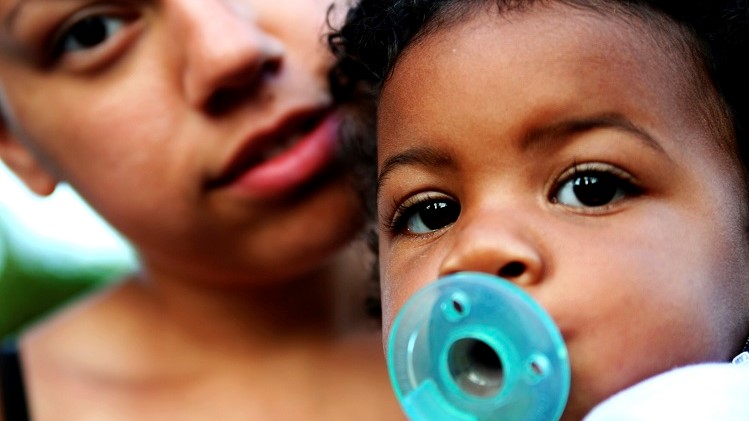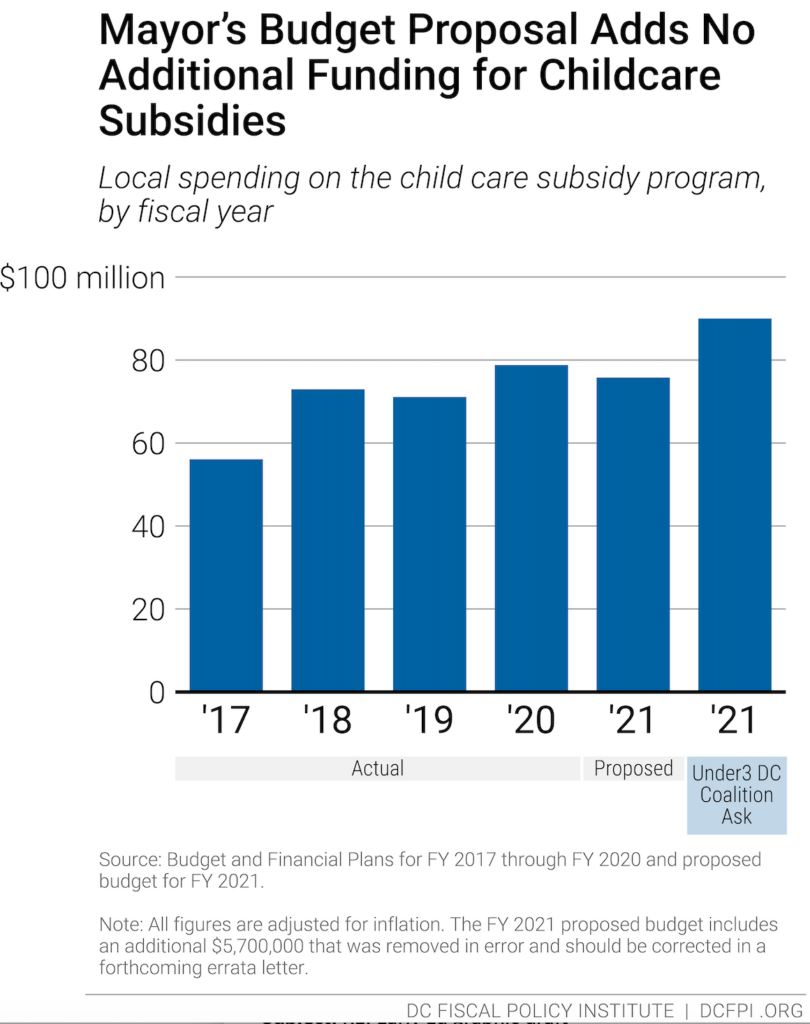
Last month, the Mayor proposed a revised budget, also known as a supplemental budget, for the current fiscal year (FY) 2020 that ends in September, and a proposed budget for FY 2021 that begins in October. Her FY 2021 proposal largely holds funding for early childhood programs flat from last fiscal year but cuts funding for critical home visiting programs. Her proposal also provides no stabilization funding for the childcare sector, which includes many small businesses on the brink of collapse due to the pandemic. Without public support, DC may lose more than 6,500 early childcare seats. The DC Council should provide $10 million in each budget to ensure the childcare industry is viable to support families as the economy reopens.
Proposed Budget Not Enough to Stabilize Child Care Industry or Meet Families’ Needs
The District’s Child Care Subsidy/Voucher Program helps offset childcare costs for families with low incomes, enabling parents to go to work or school while their children engage in positive early learning experiences. If our city’s social and economic recovery is to be inclusive and meet the needs of all DC residents, policymakers must provide strong public investments in the childcare sector.
FY 2020 Proposed Supplemental Budget
To stabilize the childcare industry, the Council should provide at least $10 million in stabilization funds in the proposed supplemental budget. This estimate is based on the average revenue loss reported by childcare providers in a survey sponsored by the Under 3 DC Coalition (U3DC).
The Mayor’s proposed supplemental FY 2020 budget fails to provide immediate stabilization funding particularly for childcare providers who receive partial or no subsidies. Many childcare providers were operating with thin margins pre-COVID-19, and due to prolonged closures and the accompanying financial loss, DC’s childcare industry requires an increase in public funding to remain intact. Altogether, childcare providers only received $342,000 from DC’s microgrant program. Per provider, that’s only about $4,000 on average. These funds only served 18 percent of the 470 licensed childcare providers in DC. Childcare providers need more support to keep their doors open.
The Office of the State Superintendent of Education (OSSE) has continued to pay subsidies to childcare centers that serve participating families, however, several childcare centers rely on a mix of subsidies and private tuition payments. Many families are unable to keep up with payments during the pandemic shut down, and the resulting revenue losses mean that some childcare centers are at risk of closing their doors permanently. Without dedicated public funding, DC is projected to lose roughly 20 percent of our city’s childcare supply.
FY 2021 Proposed Budget
As the city reopens, childcare providers will need more resources to reopen their doors for increased staff to accommodate smaller classes sizes, increased sanitization efforts, and other pandemic-induced safety and social distancing guidelines. To help meet these increased needs, the DC Council should invest at least $10 million more in childcare subsidies.
The Mayor’s proposed budget holds funding for the District’s Child Care Subsidy/Voucher Program flat over FY 2020 (Figure 1). Prior to the pandemic, DCFPI and U3DC asked policymakers for an additional $40 million investment to increase reimbursement rates to cover the full cost of childcare and ensure that early childhood educators are better compensated to match the value and skills of their work. Given that District revenues have plummeted due to the economic downturn, U3DC revised its ask to keep the program whole this year plus funding to cover new costs to address new safety needs.
In light of the pressures of COVID-19, childcare providers will need at least $10 million just to preserve their financial viability. The Council must act to ensure that thousands of workers—especially low-income and single mothers—with young children are not forced to quit their jobs or give up new work opportunities due to limited availability of safe and affordable childcare.
Budget Proposal Underfunds Other Elements of Birth-to-Three for All Law
The Mayor’s proposal cuts funding for home visiting programs, which support families of young children as they transition from pregnancy to parenting. In these voluntary programs, trained home visitors and participants regularly meet at the home or another setting that is comfortable for the family. During the COVID-19 pandemic, home visitors have the flexibility to continue providing critical services to families through telehealth visits. Protecting funding for home visiting is critical, given that these programs help prevent child abuse and neglect, support positive parenting, improve maternal and child health, and promote child development and school readiness.
FY 2020 Proposed Supplemental Budget
The proposed budget eliminated $4.1 million in home visiting funds from OSSE’s FY 2020 budget. Lawmakers initially allocated these funds to start an Early Head Start home visiting program to serve up to 815 children in immigrant families and children in families experiencing homelessness. OSSE failed to launch this program, and the Mayor did not replace these funds in the FY 2021 budget. DC Council should ensure this significant investment of $4.1 million remains in the early childhood development space by reprogramming the funds to pay for childcare stabilization.
FY 2021 Proposed Budget
The proposed budget does not renew one-time FY 2020 funding for home visiting programs run out of the District Child Family Services Agency. Home visiting is essential for families navigating circumstances and stressors that place young children at greater risk for child abuse and neglect. DC Council should allocate a modest investment of $310,000 to ensure they can continue serving families.
Healthy Futures
The Mayor’s proposed budget includes an additional $1 million over the Healthy Futures program’s $1.5 million FY 2020 budget, bringing the program’s total budget to $2.5 million. The proposal would expand the program to 75 additional sites. Currently, Healthy Futures operates in 42 childcare centers and 19 home-based childcare centers.
Healthy Futures is an evidence-based, early childhood mental health consultation program where licensed professionals provide on-site consultations to build educators’ capacity to manage and reduce challenging behaviors and promote positive social and emotional behavioral skills among children. The program also helps educators navigate their own stress with the goal of reducing staff turnover. Now more than ever, early childhood educators will need the vital coaching Healthy Futures provides so they can respond with care and compassion as childcare centers reopen.
HealthySteps
The proposed FY 2021 budget removes $300,000 from HealthySteps at the Department of Health, but it is unclear at this time whether the cut can be absorbed without leading to reduced services.
HealthySteps embeds an early childhood specialist within primary care to engage with families at each routine pediatric visit from birth to three years of age. The presence of a specialist in pediatric primary care ensures families have the support for concerns that physicians often lack time to address, such as feeding, behavior, sleep, attachment, and social determinants of health.
Help Me Grow
The Mayor’s proposal does not appear to provide any additional investments for Help Me Grow, which connects expecting parents and families to resources they need to encourage positive maternal and child health. The program also helps families locate services such as prenatal and child developmental screenings and links families to community-based support services. This service is critical as one in three children ages 4 months to 5 years old in DC are at risk of developmental delays.
Budget Proposal Makes New Investments in Childcare Infrastructure
The FY 2021 proposal includes $75 million in capital funding to add 540 new early childcare seats and 180 pre-kindergarten seats across the District. While this is a strong investment and more quality seats are needed to support DC’s long-term early childcare ecosystem, the budget should also provide funding to address immediate needs to support the growing childcare shortage stemming from COVID-19.
A Just Recovery for a Just Future
In order to fully stabilize the childcare industry and fund the programs that work to ensure DC’s children are kept safe and healthy, DC needs to raise more revenue. The District’s children and families should be able to count on strong public investments in good times and in challenging times. At DCFPI, we stand with the Fair Budget Coalition and call on Mayor Bowser and the DC Council to eliminate wasteful, corporate tax breaks and adopt new sources of revenue, including asking our wealthiest residents to pay their fair share.
